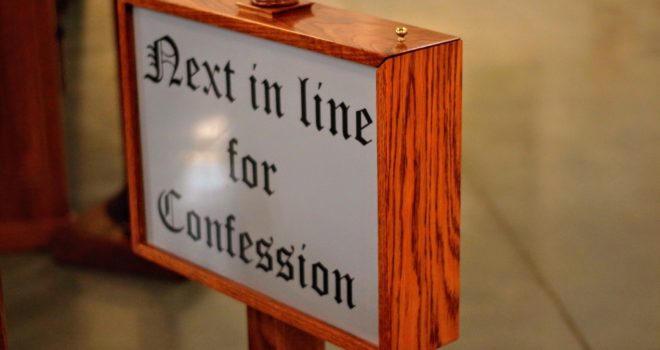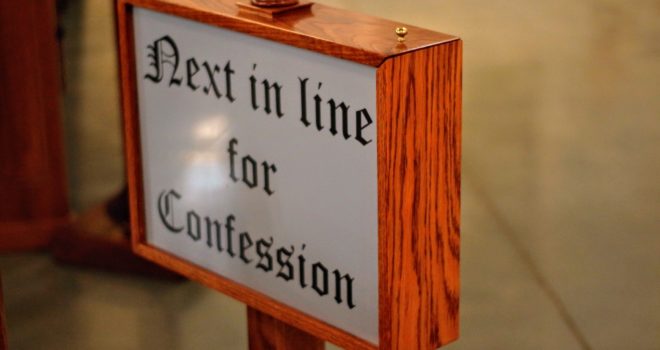Consider the old saying: “If a man divorces his wife and she goes from him and becomes another man’s wife, will he return to her? Would not that land be greatly polluted?” And you, sinning soul, “you have played the harlot with many lovers” (Jer. 3:1).
It is not I who have left you, says the Lord. No, I am a faithful spouse, one who never sues for divorce. But you, faithless soul, you have abandoned me and given yourself not to a single lover, but to thousands upon thousands of corruptors. Nevertheless, if you come back to me, says the Lord, I will receive you.
“Lift up your eyes,” and, as far as your sight can reach, you will see the marks of your infamy. Shall I repeat for you the list of your desires for vengeance, your envies, your secret hatreds, the ambition to which you have sacrificed everything, your impure and disordered loves? “You have polluted the land with your vile harlotry. You have a harlot’s brow, you refuse to be ashamed” (Jer. 3:2-3).
Come back to me; henceforth call me your father, your spouse, and the protector of your purity. Why do you wish to be far from me, like an errant bride? Will you persist in your unjust anger? You said that you would do evil, you boasted of it, and you have done it, you have been capable of it. I abandoned you to your ways. “Return,” faithless one. “I will not look upon you in anger, for I am merciful. I will not be angry forever. Only acknowledge your guilt, that you rebelled against the Lord your God and scattered your favors among strangers under every green tree,” that there was no vain pleasure that did not mislead you, “and that you have not obeyed my voice, says the Lord. Return, O faithless children” (Jer. 3:1214). Return.

Return to the paternal home, prodigal child. You shall be given the best garments. A feast shall be given for your return. The whole house shall rejoice, and your father, moved by his deep tenderness, will explain himself to the just ones who never left him, saying: “You are always with me,” but “it was fitting to make merry and be glad, for this your brother was dead, and is alive; he was lost, and is found” (Luke 15:31-12). Rejoice with me, and with the heavens above, where there are celebrations for the conversion of sinners, and understand that “there will be more joy in heaven over one sinner who repents than over ninety-nine righteous persons who need no repentance” (Luke 15:7).
“Come back, O faithless children,” come back, unfaithful spouses, “for I am your master” (Jer. 3:14). Is it my will that the impious perish or rather that he return to me and live? Return to me, repent, and your sin will not lead you to ruin. Depart from all of your lies and disobedience and make yourselves a new heart and a new spirit. Why should you wish to die, O house of Israel? “Have I any pleasure in the death of the wicked?” No, says the Lord, “I have no pleasure in the death of any one; so turn, and live” (Ezek. 18:23, 32).
“I, I am he who blots out your transgressions for my own sake,” and to satisfy my own goodness: “and I will not remember your sins,” only you must “put me in remembrance.” “Let us argue together,” for I am willing to lower myself to you. “Set forth your case”; shall you “be proved right” after I have pardoned you so many times? (Isa. 43:25-56). “Remember these things, O Jacob,” and do not forget me. “I have swept away your transgressions like a cloud,” and chased away your sins as the sun burns off the fog. Sinners, “return to me, for I have redeemed you. Sing, O heavens. Shout, O depths of the earth; break forth into singing, O mountains, O forest, and every tree in it!” For the Lord has had mercy upon us (Isa. 44:21-23).
“For as the heavens are high above the earth,” so high has he lifted up his mercy; “as far as the east is from the west, so far does he remove our transgressions from us. As a father pities his children,” so God has had pity on us, because he knows our weaknesses and that we are made of the stuff of the earth. We are nothing but mud and dust; our days “are like grass” (Ps. 103:11-15). We wilt like the flowers, and our souls, still more fragile than our bodies, are entirely lacking in strength.
Reconciliation
We can learn how much God loves peace from the beautiful precept that commands us to be reconciled with our brother before we worship, lest we approach the oblation offered to him with a resentful heart and hands bent upon vengeance.
We should be most attentive to these words: “If you are offering your gift at the altar, and there remember that your brother has something against you, leave your gift there before the altar and go; first be reconciled to your brother, and then come and offer your gift” (Matt. 5:23-24). And we should seek reconciliation not only when we have actually offended our brother, but even if he has taken offense mistakenly. We should seek a charitable resolution for fear that we might come to hate him, should we discover that he already hates us. The first gift to offer to God is a heart that is cleansed of all coldness and of all unfriendliness toward our brother.
We should not wait for Sunday, whether we are all together or by ourselves alone at Holy Mass. The Lord’s Day should be preceded by reconciliation.
We must carry to still greater lengths our love of peace. St. Paul says, “Do not let the sun go down on your anger” (Eph. 4:26). The shadows only cause our annoyance to increase. Our anger will return and awaken us in the night, and it will have become embittered. The somber, sorrowful emotions — among which are hatred, the desire for vengeance, and jealousy — become more painful during the night in the same way that wounds and fevers and illnesses do.
In quarrels, lawsuits, and disputes, each summons the other before a judge, because the offense is mutual. Both parties ought instead to seek a voluntary and mutual settlement, rather than to arrive at a judgment that will only increase the bitterness of all. This is the truth that we must consider.
St. Augustine said that the enemy with whom we must be reconciled while we are wayfarers here below is none other than the truth, which condemns us in this life, and in the next brings us to the executioner who will oblige us to pay to the last penny, that is to say, to remain forever in that appalling prison, for we will never be able to satisfy the debt of our crimes.
“Forgive us our debts, as we also have forgiven our debtors” (Matt. 6:12, Douay-Rheims). It is something worthy of our reflection that God has made the pardon that we hope for from him depend upon the pardon that he commands us to give to those who have offended us. Not content to have constantly inculcated this obligation, he has placed it in our own mouths in our daily prayer, so that should we fail to pardon, he will say to us what he said to the wicked servant: “I condemn you out of your own mouth!” (cf. Luke 19:22). You asked pardon from me, promising to pardon in return. You have pronounced your own sentence when you refused to pardon your brother. Get thee to that unhappy place where there is neither pardon nor mercy.
✠
Editor’s note: This article is adapted from two meditations in Bp Bossuet’s Meditations for Lent, which is available in ebook and paperback from Sophia Institute Press.
Photo by Shalone Cason on Unsplash













